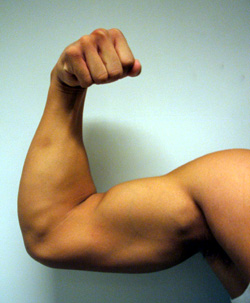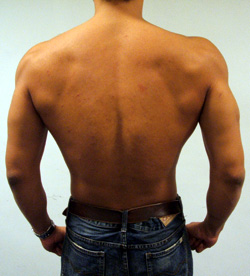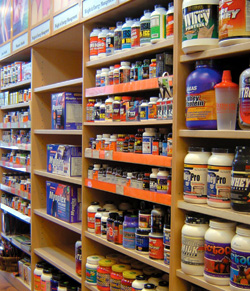Health and Beauty
Other Stories


Left photo by Anita Fang; Right photo by Kenneth Li
Powder for power
by
Yaki Wo
Craving for a well-shaped body has spurred the emergence and growth of energy supplement shops over the past decade in Hong Kong . Men dominate the market though consumers of those supplements come from all walks of life, different sexes and ages.
American Chinese exchange student Erik Zhou has taken energy supplements for more than two years. “I take protein powders when I work out in the gym more than four times a week. They help me increase lean muscle mass,” Zhou said.
Protein supplements are priced from $200 to $600, depending on the volume and purity. Products that are fat free, sugar free and cholesterol free are more expensive and are purer and healthier, as fat, sugar and cholesterol are harmful to the heart and blood vessels.
Like Zhou, most men take protein powders to increase their muscle mass as well as muscle strength or performance.
However, Gordan Siu, a student at the Hong Kong Polytechnic University , took protein powder to put on weight. After taking a “weight gainer” mix of protein and carbohydrates for two months, he managed to gain 10 pounds. Even though he quits taking the product, his weight maintains as long as he keeps working out.
“It is worth trying,” he said.
Worshippers of muscle packs desire a more masculine and stronger image; some find it sexy and attractive to their heterosexual or homosexual targets. But few of them have doubted the effectiveness of the products they take.
Stephen Wong Heung-sang, a sport science professor at the Chinese University of Hong Kong , said there was no scientific evidence that supported the effectiveness of those energy and power supplements.
If a person already has a deficiency in daily protein intake, taking supplements will surely help, he said. Yet, one can also absorb enough proteins by having a well-balanced diet.
Wong said it was often a placebo effect for consumers claiming the remarkable effects of the protein supplements.
“This is just because the consumers have paid the money and taken the products, and psychologically they feel good about themselves,” the expert of physical education said.
When people work out while taking protein supplements, they cannot tell whether the effect of becoming more muscular is because of the training they undertake or the products, Wong added.
Researches done by the American College of Sports Medicine, the American Dietetic Association and the Dietitians of Canada find that athletes need slightly more protein than non-athletes. More importantly, the vast majority of athletes can consume protein in their normal diets, and that means they need not absorb extra proteins from other supplements.
The researches point out that consuming a cup of chocolate skim milk or non-fat fruit yogurt immediately before or after working out is just as effective as ingesting protein shakes or nutrition bars for proteins to help building up muscles.
Sammy Khera, director of Nature's Village, a nutrition supplement company, observes that most Hong Kong people's diets emphasise carbohydrates and neglect proteins. They thus need to take protein supplements, he said.
“People eat a bun after they wake up every morning. It is impossible that they eat steak for breakfast,” Khera said.
He agreed to the view that if a person psychologically felt that he could attain a muscular body shape, the brain waves would exert a positive influence on muscle building. Yet, he argued it was the protein supplements that did the actual job to build up the muscle fibres.
According to Georgia Guldan, an associate professor of food and nutritional sciences at the Chinese University , very few people in Hong Kong are, in fact, deficient of protein from their normal diets. Protein is present in a lot of foodstuffs, for example dairy products. “Even in starch-based food like rice, noodles and bread, there is a little protein,” she said.
The effectiveness of protein supplements remains controversial but that of creatine is recognised.
Creatine is one of the few compounds which is scientifically proved to be effective in enhancing muscle power, particularly during high-intensity repetitive exercises such as weight-lifting and short-distance sprinting, experts said.
Consumers usually take protein supplements along with creatine, which provides extra power to the muscles by generating adenosine triphosphate, a quick energy source during intense and quick burst activity.
“Creatine makes me feel like a totally new man. It gives me more stamina and I am full of energy,” Zhou said.
However, professionals and consumers are concerned about the side effects of those energy and power supplements.
Those products are, in fact, sold as food supplements in Hong Kong . They are not under the control of the drug ordinance or surveillance of any authorities. Like selling and buying vitamin pills, no licence is needed to trade those supplements.
Many supplement sellers, for example those found in the Mongkok Commercial Padium, show little knowledge in the ingredients and effects of the products. Few of them have had training in nutrients or other related disciplines.
Consumers seldom seek professional advice before taking those supplements. But more people get information just from friends and shops, and attention is often paid to prices.
Zhou said he consulted his friend, who is a bodybuilder, on the matter.
“He is very experienced and can give a lot of advice on training and diet.” The exchange student at the Chinese University said he also got extra information from online forums where bodybuilders share their tips on how to increase muscle mass and muscle strength best.
Yet, there are common reports of headaches and muscle ache after taking energy and power supplements. For example, Siu reported “hot exhalation” and “dry throat” after using the products to gain weight. Those are symptoms of dehydration, which will emerge when the protein supplement consumer do not drink enough water.
Oxidisation of proteins will increase the burden of the kidneys too, which can lead to organ failure, or even death, though rare, experts said.
Other side effects, especially for high fat and high sugar products, include excessive urinary excretion of calcium and an increase in weight.
People who take protein supplements as a substitute of protein-rich food may have deficiencies of other nutrients found in meat and dairy food, such as iron.
Creatine, though proved to be effective in power enhancement, has a side effect of holding water content within the muscles, causing oedema, an excess of watery fluid in cavities or tissues of the body.
Khera, who has a master degree in physical education, said that was more commonly seen in consumers taking powder form creatine, but its occurrence depended on one's metabolism, fat content and blood type.
Avoid mixing creatine with juices may help alleviate the side effect, he said.
“The most important thing is balance,” Khera said. He stressed the importance of drinking more water when taking more protein.
Eating too much of any food is unhealthy, Khera said, and protein supplements are not particularly harmful as long as consumers follow the suggested dosage based on individual needs.
Noticing the growing popularity of the consumption of energy and power supplements, sport scientist Wong said he was “very conscious” about the phenomenon.
“Taking these products is very costly, but the effects are unknown…It does not matter if they are rich and they want to spend, but eating a well-balanced diet gives the same effect,” he said.
Points to remember when consuming power supplements:
1. Seek professional advice before buying any supplements
2. Be sure that you are not allergic to any food
3. Check out the place of manufacture
4. Check out the nutritional facts and ingredients
5. Follow the suggested dosage
6. Drink plenty of water
